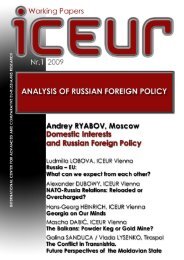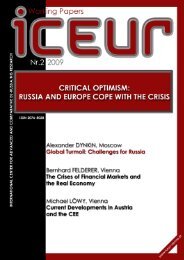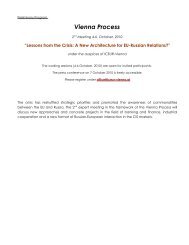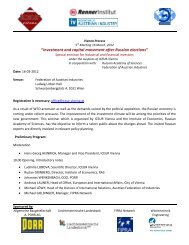EU-Russia: New Departures and Old Habits - ICEUR-Vienna
EU-Russia: New Departures and Old Habits - ICEUR-Vienna
EU-Russia: New Departures and Old Habits - ICEUR-Vienna
You also want an ePaper? Increase the reach of your titles
YUMPU automatically turns print PDFs into web optimized ePapers that Google loves.
Mark ENTIN<br />
The <strong>EU</strong> is being defamed by picturing it as an empire that only pretends to be enlightened but in fact is<br />
greedy <strong>and</strong> without principles. It is said that its only purpose is to achieve unlimited expansion at our<br />
expense in order to compensate for its own inner weakness, fragility, inconsistency <strong>and</strong> lack of<br />
competitiveness. The <strong>EU</strong> is pictured as a cunning <strong>and</strong> hypocritical geopolitical opponent that is<br />
incorporating all of our former allies by telling them about higher democratic values, the rule of human<br />
rights <strong>and</strong> their appreciation <strong>and</strong> encouraging them to criticise us for our past. It is claimed that the <strong>EU</strong>'s final<br />
goal is to make all our friends turn their backs on us, to blackmail <strong>and</strong> bind them to the <strong>EU</strong> <strong>and</strong> to turn the<br />
whole world around it into their new colonies.<br />
We have to give up these mendacious, biased <strong>and</strong> false pictures dating back to another era, we have to give up<br />
the political rhetoric of the past. The further dissemination of these ideas in the public consciousness will<br />
lead to a dead end. They are the highest barrier to be overcome if we want to reach reconciliation <strong>and</strong> friendly<br />
<strong>and</strong> allied relations between <strong>Russia</strong> <strong>and</strong> NATO, between <strong>Russia</strong> <strong>and</strong> the <strong>EU</strong> <strong>and</strong> its member states. We<br />
have to be determined, uncompromising <strong>and</strong> firm in order to build up a new culture of respectful relations<br />
<strong>and</strong> to create a new way of reporting truthfully <strong>and</strong> objectively about everything happening around us <strong>and</strong><br />
within our relations. It is of great importance to implant our societies a benevolent, <strong>and</strong> finally a friendly<br />
conception of each other. This could be the essential prologue for amicable <strong>and</strong> allied relations between the<br />
two of us.<br />
Reaching this goal is going to be a difficult task, considering the fact that there are plenty of reasons for<br />
mutual distrust <strong>and</strong> biased assessments. Nevertheless, it has to be done.<br />
III FATE OR DAMAGE DONE<br />
Many things in <strong>Russia</strong>n every-day life cause disapproval. Otherwise young people <strong>and</strong> middle-class<br />
businessmen who are tired of the never-ending extortions <strong>and</strong> insults would not want to leave the country.<br />
Whereas they do not leave <strong>Russia</strong> in search for a better life – they just want to live under normal <strong>and</strong> human<br />
conditions <strong>and</strong> would like to express themselves.<br />
On the other h<strong>and</strong>, the record of NATO, <strong>EU</strong> <strong>and</strong> its member states does not cause enthusiasm among <strong>Russia</strong>'s<br />
average inhabitants either. The majority thinks that the West has betrayed Mikhail Gorbachev <strong>and</strong> the entire<br />
Soviet leadership of the Perestroika era, <strong>and</strong>, after that of the young country <strong>Russia</strong>. They were given<br />
promises about one thing, but what they received in the end was something completely different. The<br />
assurances that NATO would act reservedly <strong>and</strong> would not push forward towards the East are only one<br />
example.<br />
The situation in <strong>Russia</strong> was particularly difficult at the very beginning, after the Soviet Union had fallen<br />
apart <strong>and</strong> the country had gained sovereignty. Factories <strong>and</strong> plants were st<strong>and</strong>ing still. Economic bonds were<br />
falling apart. The country was in no ways prepared for what was happening <strong>and</strong> blindly threw itself into the<br />
whirlpool of the unknown spheres of free market economy <strong>and</strong> privatisation. Nobody knew what to do <strong>and</strong><br />
how to do it. During these years, the country really needed help – real <strong>and</strong> far-reaching help. Its new<br />
geopolitical “friends” did not lift a finger to provide <strong>Russia</strong> with such support <strong>and</strong> to pull the country out of<br />
the abyss into which it was about to fall. They thought that some bombastic words, some almost criminally<br />
unhelpful advice <strong>and</strong> a couple of predatory loans would be sufficient. It is hard to forget things like that. The<br />
same holds true for the extremely ambiguous political <strong>and</strong> moral support for the dispersal of legislative<br />
power in 1993 as well as for the support of the re-election of the severely ill president whose ratings had not<br />
reached more than some per cent only few weeks before the elections.<br />
At the end of the decade, <strong>Russia</strong> turned out to be deeply indebted due to the most difficult crisis its<br />
transitional economy had had to go through <strong>and</strong> the overall negative economic situation, the weakness of the<br />
government <strong>and</strong> the many miscalculations that had been conducted. In order to avoid a fatal default <strong>and</strong> to<br />
get out of the abyss, the country would have needed significantly less financial support than small Greece<br />
has received now. The difference was that <strong>Russia</strong> did not get any financial aid at all. And when it began to<br />
st<strong>and</strong> on its own feet again in the early 2000s, despite of all their entreaties, despite of all pleas <strong>and</strong> dem<strong>and</strong>s<br />
the Western countries did not write off a single Dollar or Mark or Pound Sterling of <strong>Russia</strong>'s tremendously<br />
high debts. They didn't write off neither <strong>Russia</strong>'s own debts which the country had somehow managed to pile<br />
up during the economic breakdown, nor the debts it had inherited from the USSR in a doubtful manner.<br />
IC<strong>EU</strong>R-<strong>Vienna</strong> Working Papers 3|2010 8









